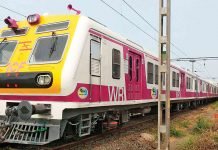DELHI (Metro Rail News): Russia’s CJSC Transmashholding (TMH) and Rail Vikas Nigam Limited (RVNL) consortium has emerged as the lowest bidder in the tender to manufacture and maintain 200 Vande Bharat Express trains.
BHEL-Titagarh has emerged as the second lowest bidder. The Indian Railways is planning to produce 200 Vande Bharat Express Trains, which are more premium than the Rajdhani Express trains. The new manufacturer will use the present technology used to manufacture Vande Bharat trains.
The sleeper version of the Vande Bharat train is being designed, and this contract will help in scaling up their production. The new manufacturer has estimated a cost of Rs 120 crore per train set for manufacturing, which is less than Rs 128 crore per Vande Bharat train set as manufactured by ICF.
| S. No. | Bidder Name | Bid Amount (Rs. Crore) / Train |
| 1 | TMH and RVNL | 120 |
| 2 | BHEL-Titagarh | 139 |
| 3 | BEML-Siemens | 145 |
| 4 | Alstom | 164.5 |
| 5 | Stadler-Medha | 165 |
Indian Railways had qualified the technical bids of five players for the Rs 58,000 crore project; BEML-Siemens, BHEL-Titagarh, Alstom, Stadler-Medha, and Russian TMH with RVNL. The lowest bidder will manufacture and maintain 120 Vande Bharat sleeper trains, while the second lowest bidder will manufacture and maintain 80 train sets.
The new Vande Bharat sleeper trains will be manufactured for a life of 35 years and are expected to be used for medium to long-distance travel. The new trains are capable of running at speeds of 160 kmph. Semi-high-speed trains like Vande Bharat sleeper can help bring down travel time between major cities to under 12 hours. Meanwhile, Indian Railways has floated a separate tender for manufacturing 100 aluminum Vande Bharat trains in India, which will be a first for railways. The technical bids for the tender were recently submitted.
The Vande Bharat Express trains are self-propelled and designed to run at speeds of up to 200 kmph, reducing travel time between cities by a significant margin. The trains have several advanced features such as automatic doors, GPS-based passenger information systems, and CCTV cameras for security.
The consortium is expected to set up a manufacturing plant in India to produce the trains, which will be made of aluminum and have a stainless steel body. The production is expected to take around five years, and the trains will initially be used on the Delhi-Varanasi and Delhi-Katra routes.
The Vande Bharat Express project is part of the Indian government’s plan to modernize and upgrade the country’s railway infrastructure. The government has been investing heavily in upgrading railway tracks, signaling systems, and rolling stock to improve safety and efficiency.
The TMH-RVNL consortium’s bid is a significant win for both countries, as it is expected to create employment opportunities in India and enhance India-Russia relations. India has been a key market for Russian defense and manufacturing companies, and the Vande Bharat project is expected to further cement ties between the two countries.
The development comes amid the ongoing tensions between India and China, with the Indian government encouraging domestic companies to reduce their dependence on Chinese imports and increase self-reliance through the ‘Atmanirbhar Bharat’ initiative. The Vande Bharat project is seen as a significant step in this direction, as it aims to create a domestic manufacturing ecosystem for high-speed trains in India.
Overall, the emergence of the TMH-RVNL consortium as the lowest bidder for the Vande Bharat project is being hailed as a significant milestone in India’s efforts to modernize and upgrade its railway infrastructure and promote domestic manufacturing.








